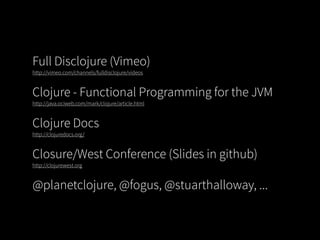Das Dokument beschreibt funktionale Programmierung mit Clojure anhand praktischer Beispiele und Erfahrungen des Autors, der über umfangreiche Erfahrungen mit verschiedenen Programmiersprachen verfügt. Es werden Vorteile von Clojure, wie die Einfachheit und Flexibilität bei der Codeerstellung, sowie Vergleiche zu Java und Scala hervorgehoben. Zudem werden Tools und Frameworks im Clojure-Ökosystem thematisiert, um Entwicklungsprozesse zu optimieren.







![Reduktion aufs Wesentliche
Java:
class HelloWorldApp {
public static void main(String[] args) {
System.out.println("Hello World!");
}
}
Clojure:
(println "Hello World!")
SIMPLICITY](https://image.slidesharecdn.com/clojure-intro-130109023714-phpapp01/85/Funktionales-Programmieren-mit-Clojure-8-320.jpg)
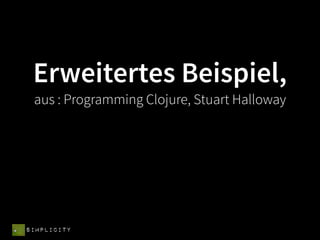
![org.apache.commons.lang.StringUtils:
indexOfAny - findet in einem String das erste Vorkommen eines Zeichens aus einer
vorgegebenen Menge
StringUtils.indexOfAny(null, *) = -1
StringUtils.indexOfAny("", *) = -1
StringUtils.indexOfAny(*, null) = -1
StringUtils.indexOfAny(*, []) = -1
StringUtils.indexOfAny("zzabyycdxx",['z','a']) = 0
StringUtils.indexOfAny("zzabyycdxx",['b','y']) = 3
StringUtils.indexOfAny("aba", ['z']) = -1
SIMPLICITY](https://image.slidesharecdn.com/clojure-intro-130109023714-phpapp01/85/Funktionales-Programmieren-mit-Clojure-10-320.jpg)
![public static int indexOfAny(String str, char[] searchChars) {
if (isEmpty(str) || ArrayUtils.isEmpty(searchChars)) {
return -1;
}
for (int i = 0; i < str.length(); i++) {
char ch = str.charAt(i);
for (int j = 0; j < searchChars.length; j++) {
if (searchChars[j] == ch) {
return i;
}
return -1;
}
}
}
SIMPLICITY](https://image.slidesharecdn.com/clojure-intro-130109023714-phpapp01/85/Funktionales-Programmieren-mit-Clojure-11-320.jpg)

![(defn indexed [coll] (map vector (iterate inc 0) coll))
(indexed "abcde")
([0 a] [1 b] [2 c] [3 d] [4 e])
SIMPLICITY](https://image.slidesharecdn.com/clojure-intro-130109023714-phpapp01/85/Funktionales-Programmieren-mit-Clojure-13-320.jpg)
![(defn index-filter [pred coll]
(when pred
(for [[idx elt] (indexed coll) :when (pred elt)] idx)))
(index-filter #{a b} "abcdbbb")
(0 1 4 5 6)
(index-filter #{a b} "xyz")
()
SIMPLICITY](https://image.slidesharecdn.com/clojure-intro-130109023714-phpapp01/85/Funktionales-Programmieren-mit-Clojure-14-320.jpg)
![(defn index-of-any [pred coll]
(first (index-filter pred coll)))
(index-of-any #{z a} "zzabyycdxx")
0
(index-of-any #{b y} "zzabyycdxx")
3
SIMPLICITY](https://image.slidesharecdn.com/clojure-intro-130109023714-phpapp01/85/Funktionales-Programmieren-mit-Clojure-15-320.jpg)
![(defn indexed [coll]
(map vector (iterate inc 0) coll))
(defn index-filter [pred coll]
(when pred
(for [[idx elt] (indexed coll) :when (pred elt)] idx)))
(defn index-of-any [pred coll]
(first (index-filter pred coll)))
SIMPLICITY](https://image.slidesharecdn.com/clojure-intro-130109023714-phpapp01/85/Funktionales-Programmieren-mit-Clojure-16-320.jpg)
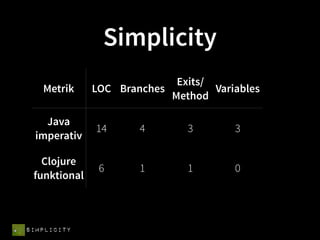

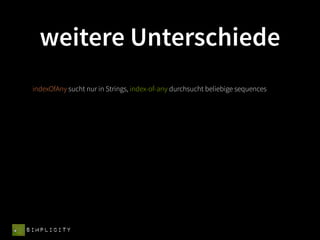
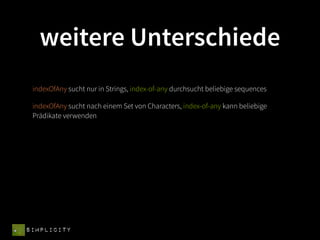
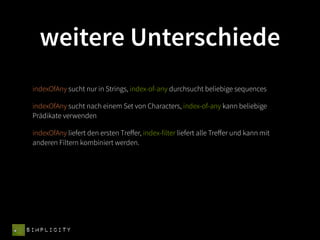
![weitere Unterschiede
indexOfAny sucht nur in Strings, index-of-any durchsucht beliebige sequences
indexOfAny sucht nach einem Set von Characters, index-of-any kann beliebige
Prädikate verwenden
indexOfAny liefert den ersten Treffer, index-filter liefert alle Treffer und kann mit
anderen Filtern kombiniert werden.
find the third occurrence of “heads” in a series of coin flips:
(nth (index-filter #{:h} [:t :t :h :t :h :t :t :t :h :h]) 2)
8
SIMPLICITY](https://image.slidesharecdn.com/clojure-intro-130109023714-phpapp01/85/Funktionales-Programmieren-mit-Clojure-22-320.jpg)
![weitere Unterschiede
indexOfAny sucht nur in Strings, index-of-any durchsucht beliebige sequences
indexOfAny sucht nach einem Set von Characters, index-of-any kann beliebige
Prädikate verwenden
indexOfAny liefert den ersten Treffer, index-filter liefert alle Treffer und kann mit
anderen Filtern kombiniert werden.
find the third occurrence of “heads” in a series of coin flips:
one,
(nth (index-filter #{:h} [:t :t :h :t :h :t :t :t :h :h]) 2)
pr
8
s er ror
er, les
si mpl gene ral
SIMPLICITY and more](https://image.slidesharecdn.com/clojure-intro-130109023714-phpapp01/85/Funktionales-Programmieren-mit-Clojure-23-320.jpg)
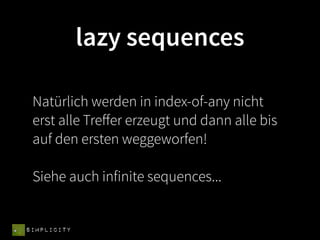
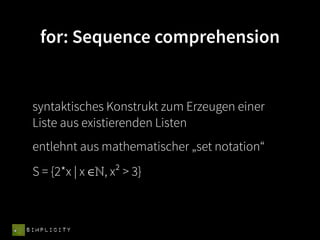


![Beispiel aus dem Noir Webframework:
(defpage „/person/:id.html“ [id]
...)
UNSERE! Sprache](https://image.slidesharecdn.com/clojure-intro-130109023714-phpapp01/85/Funktionales-Programmieren-mit-Clojure-28-320.jpg)
![Beispiel aus Monger:
;; find scores 10 to 20
(with-collection "scores"
(find {})
(fields ,,, [:score :name])
(sort ,,, {:score -1})
(limit ,,, 10)
(skip ,,, 10))
UNSERE! Sprache](https://image.slidesharecdn.com/clojure-intro-130109023714-phpapp01/85/Funktionales-Programmieren-mit-Clojure-29-320.jpg)
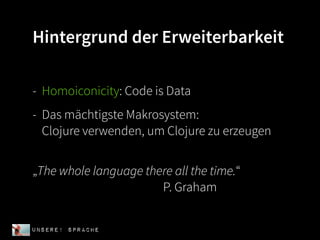

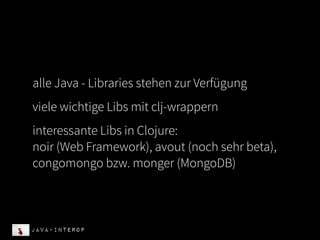



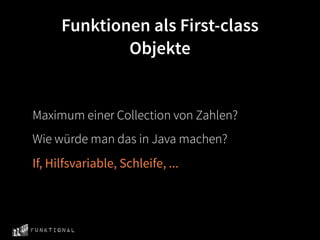
![(reduce max [35 62 -12 43 56 7])
Funktional](https://image.slidesharecdn.com/clojure-intro-130109023714-phpapp01/85/Funktionales-Programmieren-mit-Clojure-37-320.jpg)

![Sortieren
Sortieren einer Liste von Geboten nach :bid (invers) und :timestamp (ältestes zuerst)
(first
(sort-by
(juxt (comp (partial * -1) :bid)
:timestamp)
[{:id "af1" :bid 1 :timestamp 1}
{:id "ba3" :bid 12 :timestamp 3}
{:id "cd7" :bid 12 :timestamp 2}]))
Und ja, normalerweise machen wir das auch in der Datenbank ;)
Funktional](https://image.slidesharecdn.com/clojure-intro-130109023714-phpapp01/85/Funktionales-Programmieren-mit-Clojure-39-320.jpg)
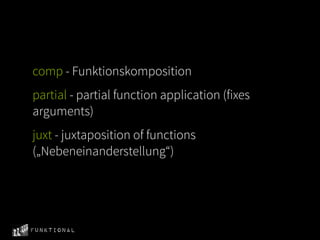
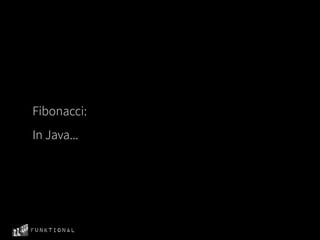
![In Clojure - trivial:
(defn fibonacci [a]
(cond
(> a 1) (+ (fibonacci (- a 2)) (fibonacci (- a 1)))
(= a 1) 1
(= a 0) 0)
Funktional](https://image.slidesharecdn.com/clojure-intro-130109023714-phpapp01/85/Funktionales-Programmieren-mit-Clojure-42-320.jpg)
![In Clojure - clojure style
(def fib-seq
((fn rfib [a b]
(lazy-seq (cons a (rfib b (+ a b)))))
0 1))
(take 20 fib-seq)
Funktional](https://image.slidesharecdn.com/clojure-intro-130109023714-phpapp01/85/Funktionales-Programmieren-mit-Clojure-43-320.jpg)

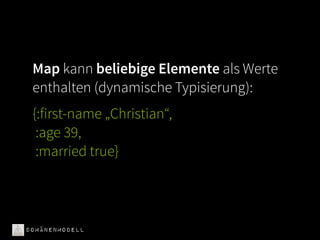

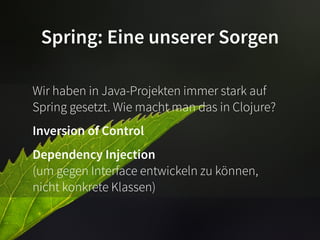
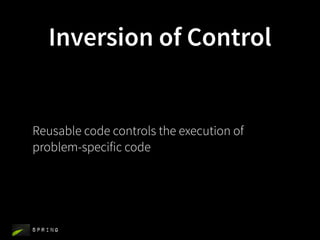

![Dependency Injection
Zentral
(declare create-person)
Im „Nutzcode“
(create-person „Christian“ „Betz“ :age 39)
In der Definition
(defn create-person [first-name last-name ...] ...)
Spring](https://image.slidesharecdn.com/clojure-intro-130109023714-phpapp01/85/Funktionales-Programmieren-mit-Clojure-50-320.jpg)


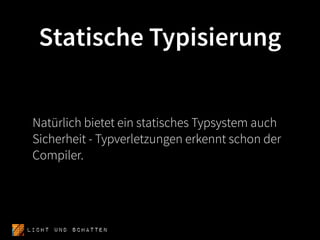
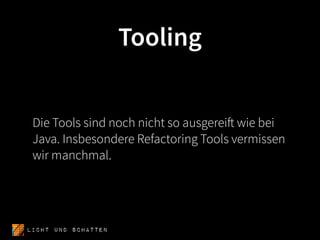
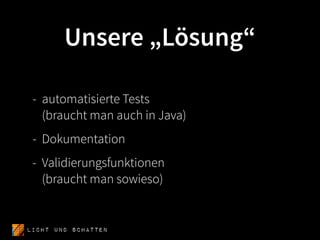


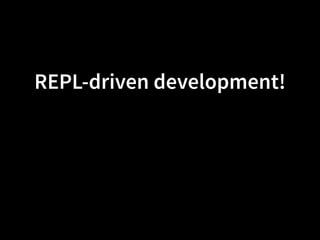
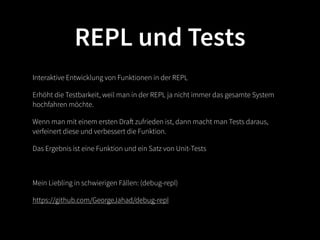

![Hacks explained: apropos+
(ns dev.apropos)
(defn apropos+
"Given a regular expression or stringable thing, return a seq of all definitions in all currently-loaded
namespaces that match the str-or-pattern."
[str-or-pattern]
(let [matches? (if (instance? java.util.regex.Pattern str-or-pattern)
#(re-find str-or-pattern (str (key %)))
#(.contains (str (key %)) (str str-or-pattern)))]
(for [ns (all-ns)
public (ns-publics ns)
:when (matches? public)]
(second public))))
;; (in-ns 'user)
;; (use 'dev.apropos)
;; (apropos+ "*warn")](https://image.slidesharecdn.com/clojure-intro-130109023714-phpapp01/85/Funktionales-Programmieren-mit-Clojure-61-320.jpg)
![Hacks explained: apropos+
(ns dev.apropos)
(defn apropos+
"Given a regular expression or stringable thing, return a seq of all definitions in all currently-loaded
namespaces that match the str-or-pattern."
[str-or-pattern]
(let [matches? (if (instance? java.util.regex.Pattern str-or-pattern)
#(re-find str-or-pattern (str (key %)))
#(.contains (str (key %)) (str str-or-pattern)))]
(for [ns (all-ns)
public (ns-publics ns)
:when (matches? public)]
(second public))))
;; (in-ns 'user)
;; (use 'dev.apropos)
;; (apropos+ "*warn")](https://image.slidesharecdn.com/clojure-intro-130109023714-phpapp01/85/Funktionales-Programmieren-mit-Clojure-62-320.jpg)
![Hacks explained: apropos+
(ns dev.apropos)
(defn apropos+
"Given a regular expression or stringable thing, return a seq of all definitions in all currently-loaded
namespaces that match the str-or-pattern."
[str-or-pattern]
(let [matches? (if (instance? java.util.regex.Pattern str-or-pattern)
#(re-find str-or-pattern (str (key %)))
#(.contains (str (key %)) (str str-or-pattern)))]
(for [ns (all-ns)
public (ns-publics ns)
:when (matches? public)]
(second public))))
;; (in-ns 'user)
;; (use 'dev.apropos)
;; (apropos+ "*warn")](https://image.slidesharecdn.com/clojure-intro-130109023714-phpapp01/85/Funktionales-Programmieren-mit-Clojure-63-320.jpg)
![Hacks explained: apropos+
(ns dev.apropos)
(defn apropos+
"Given a regular expression or stringable thing, return a seq of all definitions in all currently-loaded
namespaces that match the str-or-pattern."
[str-or-pattern]
(let [matches? (if (instance? java.util.regex.Pattern str-or-pattern)
#(re-find str-or-pattern (str (key %)))
#(.contains (str (key %)) (str str-or-pattern)))]
(for [ns (all-ns)
public (ns-publics ns)
:when (matches? public)]
(second public))))
;; (in-ns 'user)
;; (use 'dev.apropos)
;; (apropos+ "*warn")](https://image.slidesharecdn.com/clojure-intro-130109023714-phpapp01/85/Funktionales-Programmieren-mit-Clojure-64-320.jpg)
![Hacks explained: apropos+
(ns dev.apropos)
(defn apropos+
"Given a regular expression or stringable thing, return a seq of all definitions in all currently-loaded
namespaces that match the str-or-pattern."
[str-or-pattern]
(let [matches? (if (instance? java.util.regex.Pattern str-or-pattern)
#(re-find str-or-pattern (str (key %)))
#(.contains (str (key %)) (str str-or-pattern)))]
(for [ns (all-ns)
public (ns-publics ns)
:when (matches? public)]
(second public))))
;; (in-ns 'user)
;; (use 'dev.apropos)
;; (apropos+ "*warn")](https://image.slidesharecdn.com/clojure-intro-130109023714-phpapp01/85/Funktionales-Programmieren-mit-Clojure-65-320.jpg)
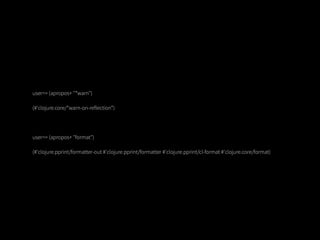



![lein (https://github.com/technomancy/leiningen)
~/.lein/profiles.clj:
{:user {:plugins [[lein-midje "2.0.0-SNAPSHOT"]
[lein-noir "1.2.1"]
]}}
noir (http://webnoir.org)
foundation: (http://foundation.zurb.com/)
Branch: http://branch.com/featured
-> lein new noir gwitter
http://localhost:8080/](https://image.slidesharecdn.com/clojure-intro-130109023714-phpapp01/85/Funktionales-Programmieren-mit-Clojure-70-320.jpg)

